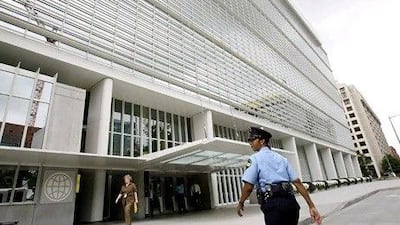The world is at a crossroads. Either the global community will join together to fight poverty, resource depletion and climate change, or it will face a generation of resource wars, political instability and environmental ruin.
The World Bank, if properly led, can play a key role in averting these threats and the risks that they imply. The global stakes are thus very high this spring as the bank's 187 member countries choose a new president to succeed Robert Zoellick, whose term ends in July.
The World Bank was established in 1944 to promote economic development and virtually every country is now a member. Its central mission is to reduce global poverty and ensure global development is environmentally sound and socially inclusive. Achieving these goals would not only improve the lives of billions of people, but would also forestall violent conflicts that are stoked by poverty, famine and struggles over scarce resources.
US officials have traditionally viewed the World Bank as an extension of US foreign policy and commercial interests. With the bank just two blocks away from the White House on Pennsylvania Avenue, it has been all too easy for the US to dominate the institution. Now many members, including Brazil, China, India, and several African countries, are raising their voices in support of more collegial leadership and an improved strategy that works for all.
Until now, the unwritten rule has been that the US government simply designates each new president: all 11 have been Americans, and not one has been an expert in economic development, the bank's core responsibility, or had a career in fighting poverty or promoting environmental sustainability. Instead, the US has selected Wall Street bankers and politicians, presumably to ensure that the bank's policies are suitably friendly to US interests.
Yet the policy is backfiring on the US and badly hurting the world. Because of a long-standing lack of strategic expertise at the top, the bank has lacked a clear direction. Many projects have catered to US corporate interests rather than to sustainable development. The bank has solved far too few global problems.
For too long, its leadership has imposed US concepts that are often utterly inappropriate for the poorest countries and their poorest people. It completely fumbled the exploding pandemics of AIDS, tuberculosis and malaria during the 1990's, failing to get help to where it was needed to save millions of lives.
Even worse, the bank advocated user fees and "cost recovery" for health services, thereby putting life-saving health care beyond the reach of the poorest of the poor - precisely those most in need of it. In 2000, at the Durban AIDS Summit, I recommended a new "Global Fund" to fight these diseases, precisely on the grounds that the World Bank was not doing its job. The Global Fund to Fight AIDS, TB, and Malaria emerged, and has since saved millions of lives, with malaria deaths in Africa alone falling by at least 30 per cent.
The bank similarly missed crucial opportunities to support smallholder subsistence farmers and to promote integrated rural development more generally in impoverished rural communities in Africa, Asia, and Latin America. Its staff are highly professional, and would accomplish much more if freed from the dominance of narrow US interests and viewpoints. It has the potential to be a catalyst of progress in key areas that will shape the world's future. Its priorities should include agricultural productivity; mobilisation of information technologies for sustainable development; deployment of low-carbon energy systems; and quality education for all, with greater reliance on new forms of communication to reach millions of under-served students.
Despite the excellence of its staff, the bank has not been strategic or agile enough to be an effective agent of change. Getting the role right will be hard work, requiring expertise at the top.
Jeffrey Sachs is a professor of economics and the director of the Earth Institute at Columbia University. He is also a special adviser to the UN secretary general on the Millennium Development Goals
* Project Syndicate
twitter: Follow our breaking business news and retweet to your followers. Follow us

